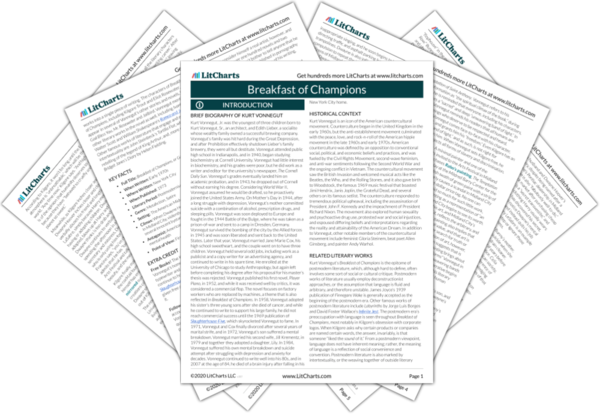Welcome to the LitCharts study guide on Kurt Vonnegut's Breakfast of Champions. Created by the original team behind SparkNotes, LitCharts are the world's best literature guides.
Breakfast of Champions: Introduction
Breakfast of Champions: Plot Summary
Breakfast of Champions: Detailed Summary & Analysis
Breakfast of Champions: Themes
Breakfast of Champions: Quotes
Breakfast of Champions: Characters
Breakfast of Champions: Symbols
Breakfast of Champions: Theme Wheel
Brief Biography of Kurt Vonnegut

Historical Context of Breakfast of Champions
Other Books Related to Breakfast of Champions
- Full Title: Breakfast of Champions, or Goodbye Blue Monday
- When Written: Early 1970s
- Where Written: New York City
- When Published: 1973
- Literary Period: Postmodernism
- Genre: Metafiction, Satire
- Setting: The American Midwest
- Climax: When Dwayne Hoover goes insane and “runs amok” in Midland City, violently assaulting his son, Bunny, and several innocent bystanders.
- Antagonist: American society; Dwayne’s struggle with mental health
- Point of View: First-person omniscient
Extra Credit for Breakfast of Champions
Free Books! The Kurt Vonnegut Memorial Library in Vonnegut’s hometown, Indianapolis, is the home of Vonnegut’s typewriter and several signed copies of his work, but they also continue to honor the author’s fight against censorship. Slaughterhouse-Five, a book often banned in public schools, is given free at the door to any student whose school has banned it.
Follow Me on Twitter. Despite his death in 2007, a Twitter account dedicated to Vonnegut is alive and well, tweeting Vonnegut’s witticisms multiple times a day. Famous Vonnegut quotes populate the account, including “We are what we pretend to be, so we must be careful what we pretend to be,” and “Evolution is so creative. That’s how we got giraffes.”












